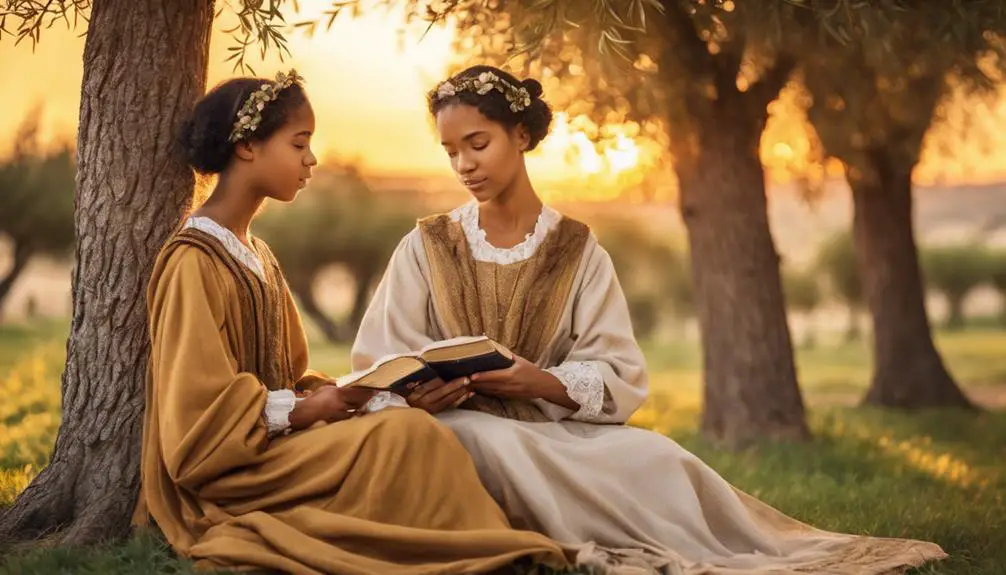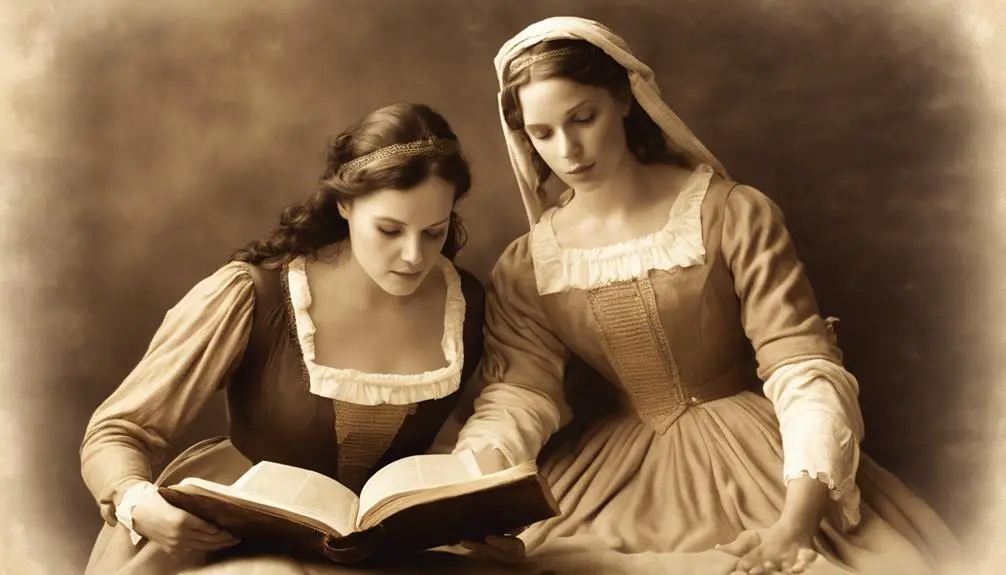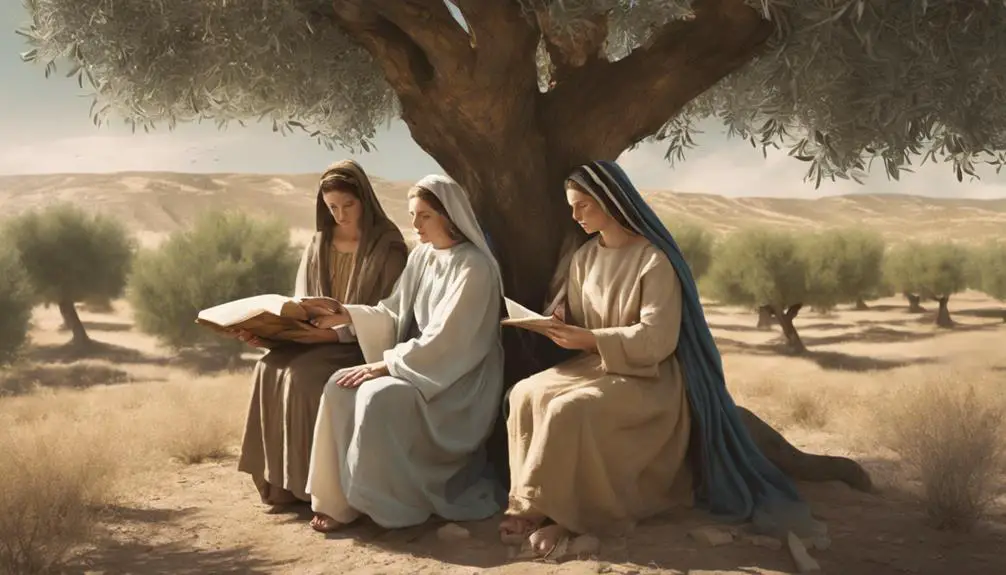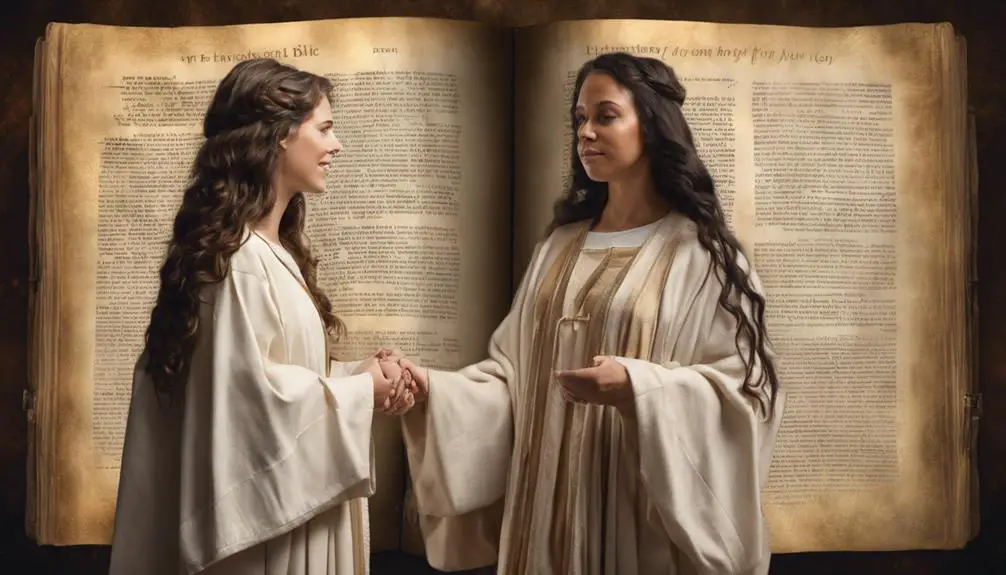Marvel at the representation of sisterhood in the KJV Bible, as we uncover the profound influence of over 130 verses about sisters.

Are There Any Verses About Sisters in the Kjv Bible
Did you know that the term 'sister' is mentioned over 130 times in the King James Version (KJV) of the Bible?
It's intriguing to explore how these instances portray the roles and relationships of sisters in biblical times.
From famous sibling pairs to symbolic sisterhoods, the biblical representation of sisters offers a fascinating insight into this familial bond.
You might be surprised to see how these verses can influence our understanding of sisterhood today.
So, why not join this exploration into the Bible's portrayal of sisters?
Key Takeaways
- The term 'sister' appears over 130 times in the KJV Bible, denoting both biological and spiritual relationships.
- Sisters played influential roles in biblical narratives, including Miriam, Rachel, Leah, Naomi, Ruth, Mary, Martha, and Phoebe.
- Understanding biblical verses about sisters requires context and cultural nuances, emphasizing spiritual bonds and equal unity among believers.
- The Bible celebrates sisterhood through examples like Phoebe and the relationship between Ruth and Naomi, highlighting the spiritual kinship and communal spirit in Christianity.
Exploring Biblical References to Sisters

Diving into the sacred pages of the King James Bible, you'll uncover a wealth of references to sisters, each shedding unique light on the vital roles they play within the biblical narrative. These references span the breadth of the scriptures, ranging from the Old to the New Testament, and are scattered across various books, from Genesis to Revelation.
Take a moment to ponder on the intricacy of these mentions. You'll find that the term 'sister' isn't just used to denote a biological sibling relationship. It's also employed metaphorically, illustrating spiritual relationships within the church community. These references, although seemingly simple, hold profound implications about God's perspective on sisterhood and relationships.
In the New Testament, for instance, you'll find verses referring to women as 'sisters' in faith, emphasizing the spiritual kinship among believers. It's not a term used lightly, but conveys a sense of deep spiritual connection, mutual respect, and shared faith. This interpretation of 'sister' underscores the value God places on spiritual bonds, suggesting they're as significant as biological ties.
In essence, the biblical references to sisters reveal much about the divine perspective on relationships, community, and the essence of true sisterhood.
The Role of Sisters in Old Testament

Looking back to the Old Testament, you'll find that the role of sisters was equally significant and multifaceted, shaping narratives and influencing the course of biblical events. Sisters weren't just silent observers but active participants, often displaying wisdom, courage, and faith in critical situations.
Take Miriam, for instance, Moses' sister. Her bravery and quick thinking ensured the survival of her brother, who went on to liberate the Israelites from Egyptian slavery. She was also a prophetess, leading women in worship after the crossing of the Red Sea.
Rachel and Leah, Jacob's wives, were also sisters. Their story is complex, filled with rivalry and love, but through them, God built the twelve tribes of Israel. Their influence is undeniable, underpinning the nation's heritage.
Then there's Naomi and her sister-in-law Ruth. Their relationship goes beyond typical kinship, embodying unwavering loyalty. Ruth's decision to stay with Naomi, despite the hardship, led to her becoming the great-grandmother of King David, and part of the lineage of Jesus Christ.
In the Old Testament, sisters were more than just siblings. They were leaders, peacemakers, and nation builders, playing pivotal roles in God's plan.
Sisters in The New Testament Verses

Transitioning to the New Testament, you'll find that the narrative of sisters continues to be a compelling element in the scriptures, with their roles and relationships providing profound insights into the teachings of Christ.
Take Mary and Martha, for instance. This pair of sisters, found in Luke 10:38-42, showcase contrasting personalities and approaches towards Christ. Mary, the contemplative one, chooses to sit at Jesus' feet, absorbing His teachings. Martha, on the other hand, is engrossed in serving Christ, emphasizing the importance of works. These sisters beautifully illustrate two aspects of Christian discipleship: learning and serving.
In another reference, Phoebe, a sister in the church of Cenchreae, mentioned in Romans 16:1, is celebrated for her service to the church and Paul. Her inclusion underlines the significant roles women played in early Christianity.
Moreover, the term 'sister' also transcends biological boundaries, serving as a term of endearment and spiritual connection within the Christian community. This broader sense of sisterhood is evident in numerous verses such as Romans 16:1 and 1 Timothy 5:2.
Interpretation of Sisterhood Verses

To fully grasp the richness of sisterhood verses in the Bible, it's crucial for you to delve into their interpretation, taking into account the historical context, cultural nuances, and theological implications. This exploration will help you discern the deeper truths embedded in these verses.
When interpreting these scriptures, it's essential to consider the societal structure of the times. Women were often identified in relation to their male kinfolk, but the term 'sister' was also used to express close bonds among women. For instance, in Ruth 1:16-17, Ruth's dedication to Naomi transcends blood ties, illustrating how sisterhood is about shared experiences and loyalty.
Theologically, these verses also convey the spiritual bond within the body of Christ. Galatians 3:28 elucidates that in Christ, there's neither male nor female, highlighting the equal value and unity among believers. Understanding this, when 'sister' is used in a spiritual sense, it's a profound expression of shared faith and kinship in Christ.
In essence, these verses aren't just about biological sisters. They're a testament to the deep bonds of love, commitment, and spiritual unity that surpass blood relations and social constructs. Understanding this gives you a richer appreciation of these biblical texts.
How Sisterhood Is Celebrated in the Bible

Building on this rich understanding of sisterhood in biblical contexts, let's now explore how sisterhood is celebrated in the Bible, showcasing not just the bond between women, but also the spiritual unity among believers.
In Romans 16:1, Paul refers to Phoebe as 'our sister', a commendation that goes beyond the familial, underscoring her spiritual kinship with the early Christian community. This is more than a casual mention; it's a recognition of her role and the respect she commands within the congregation.
Elsewhere, in the book of Ruth, the relationship between Ruth and Naomi provides an inspiring example of sisterhood. Their bond, formed out of shared adversity, transcends the traditional mother-in-law and daughter-in-law relationship, morphing into a sisterhood characterized by mutual loyalty and love. Ruth's statement, 'Where you go, I'll go; where you lodge, I'll lodge' (Ruth 1:16), encapsulates this profound bond.
Such examples show that sisterhood, in the biblical sense, is a cherished relationship that extends beyond blood ties, reflecting a deeper spiritual connection among believers. It's a bond that's nurtured through shared experiences, mutual respect, and love, underscoring the communal spirit that lies at the heart of Christian living.
Conclusion
Indeed, the Bible, specifically the KJV version, offers numerous verses that celebrate and explore the concept of sisterhood. These verses, found in both the Old and New Testaments, underscore the vital role that sisters play in families and communities.
These interpretations not only emphasize familial bonds but also highlight the spiritual significance of sisterhood. So let's continue to cherish the divine wisdom in these verses and strive to embody the values they promote in our relationships.



Sign up